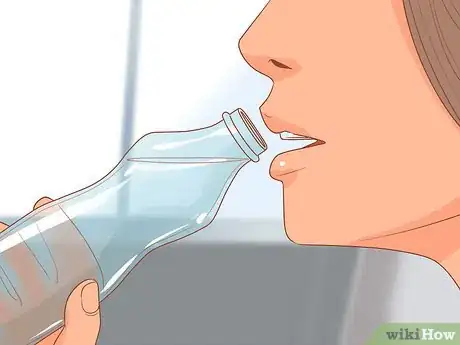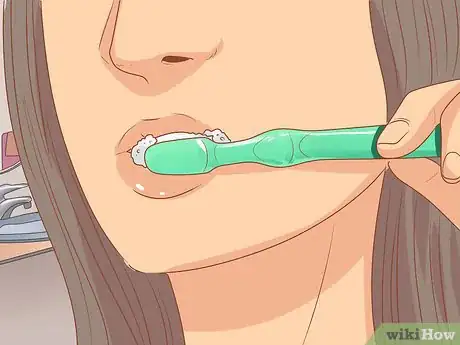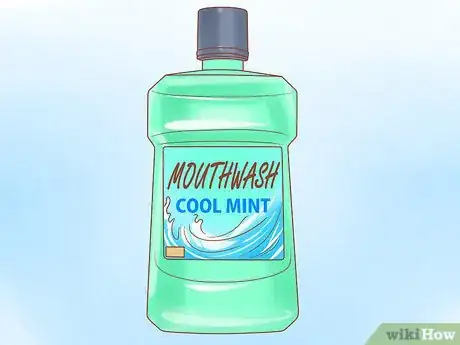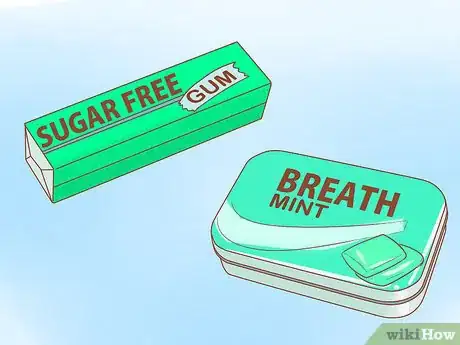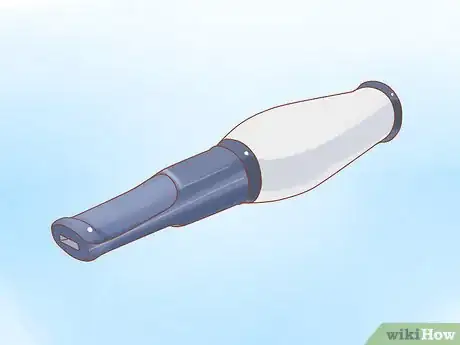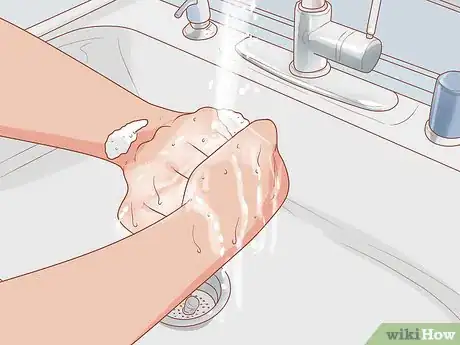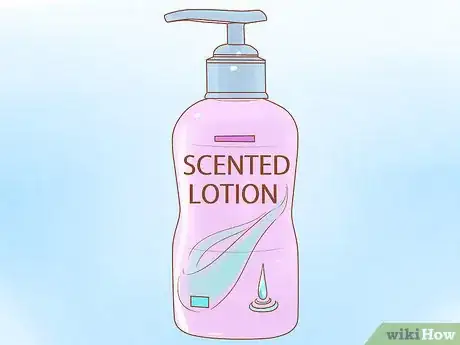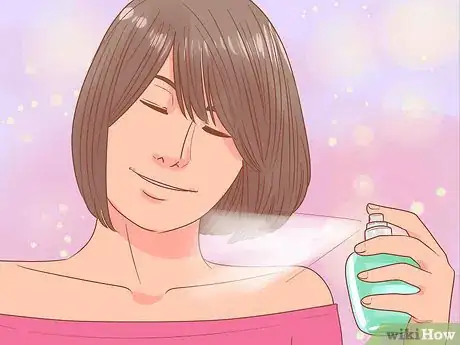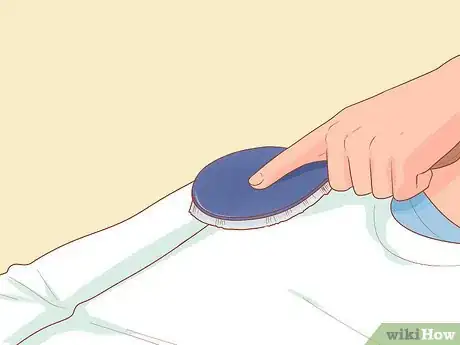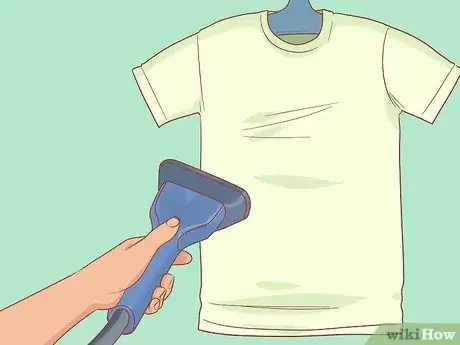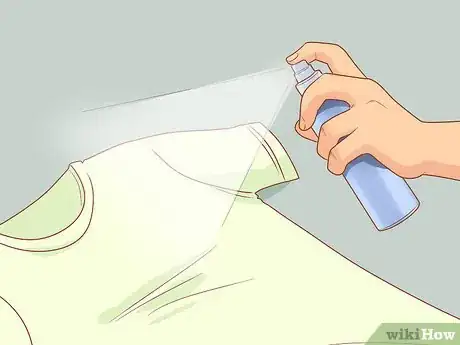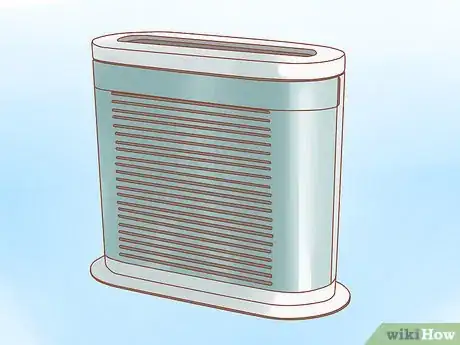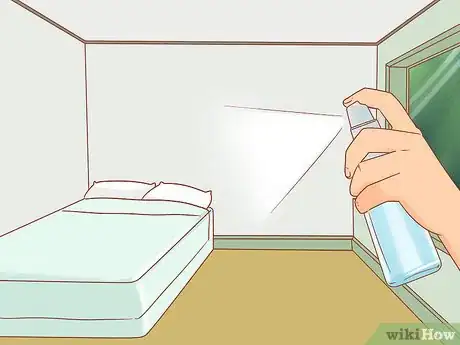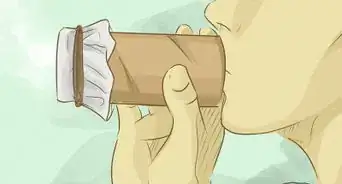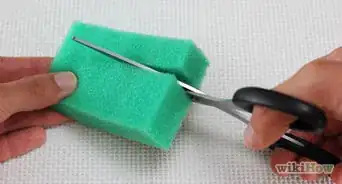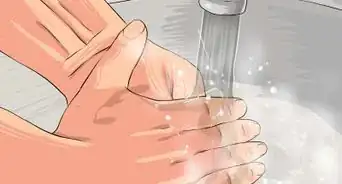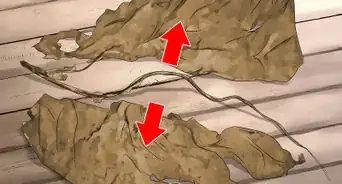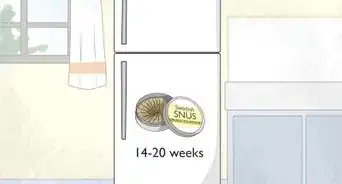This article was co-authored by wikiHow Staff. Our trained team of editors and researchers validate articles for accuracy and comprehensiveness. wikiHow's Content Management Team carefully monitors the work from our editorial staff to ensure that each article is backed by trusted research and meets our high quality standards.
This article has been viewed 230,548 times.
Learn more...
Whether you smoke the occasional cigar or a pack of cigarettes every day, the odors left on your body and around your environment can be unpleasant to you and those around you. Using odor-neutralizing sprays around your home and on your clothes can help reduce the smells. Similarly, attention to cleaning and deodorizing your hands, mouth, and body will help get rid of the odors clinging onto you. Keep in mind that smoking is a leading cause of death and that the effects of secondhand smoke can be fatal. The only real way to eliminate these foul odors completely is to quit smoking.
Steps
Eliminating Smoker’s Breath
-
1Stay hydrated to minimize lingering odors on your breath. Before and during a smoking session, drink plenty of water. By staying hydrated, you’ll keep your inner mouth moist which helps odorous particles move out of your mouth and through your system.[1]
-
2Brush your teeth and tongue as soon as possible after smoking. Use toothpaste and a toothbrush to thoroughly scrub all of your teeth to clean them off and remove any residue. Spit out most of the foamy toothpaste and then brush your tongue as well. To do this, scrub the toothbrush gently over the top, sides, and underside of your tongue to really freshen up your mouth and breath. Rinse out the toothpaste with water when you’re finished.[2]
- Bring a portable toothbrush and toothpaste with you so you can quickly freshen up your mouth on the go.
- Keep in mind that even if you practice a good oral hygiene routine, smoking has irreversible damaging effects on your oral health.[3]
Advertisement -
3Gargle mouthwash after smoking to freshen your breath. After you’ve brushed your teeth, follow up by gargling a minty mouthwash to leave your teeth, tongue, and gums clean and odor-free. You can precede a commercial mouthwash rinse by gargling a homemade solution of hydrogen peroxide and water to really clean out your mouth.
- To make a homemade mouthwash, mix equal parts water and hydrogen peroxide. Gargle some of this solution and spit it out.
- You can even brush your teeth once again using a clean toothbrush and the remaining homemade solution. Finish by gargling a commercial mouthwash to leave your mouth with a fresh mint flavor.[4]
- Hydrogen peroxide kills bacteria and it will also help whiten your teeth which develop yellow stains after smoking.
- Be careful not to swallow either the hydrogen peroxide and water solution or the mouthwash.
-
4Chew sugar-free gum or breath mints before and after smoking. Gum and breath mints are useful for when you can’t brush your teeth right away. They’ll help freshen your mouth and breath before and after you smoke, helping reduce the smokey taste and odor.[5]
- Use a mint or piece of gum before smoking so you have fresher breath to begin with. Otherwise the odors will mingle with your stale breath from earlier in the day. One breath mint won’t be able to hide this.
- Opt for sugar-free gum and mints instead of the full-sugar versions. This way you won’t be consuming lots of unnecessary sugar anytime you want to freshen your breath.
Minimizing Smoke Odors on Your Body
-
1Use a cigarette holder to protect your fingers from smells and stains. Fumes permeate through the sides of a cigarette, so your fingers are sure to reek after gripping a cigarette directly. Place a cigarette holder at the end of your cigarette and use this to hold the cigarette while smoking.
- Purchase a real cigarette holder from an online retailer or local smoke shop. Don’t use a fake cigarette holder that’s only meant for costume parties since it could melt.
- Try using a piece of folded-up paper towel as a makeshift cigarette holder. The goal is to prevent your fingers from touching the outside of the cigarette.
-
2Sanitize your hands with warm, soapy water or hand sanitizer. Immediately after smoking, wash your hands thoroughly with warm, soapy water to get rid of lingering particles. This might not remove the odors completely, so apply a dollop of hand sanitizer next.[6]
- Be sure to get the soap and hand sanitizer under and around your fingernails where particles and odors can get stuck.
-
3Apply scented lotion to your hands after sanitizing them. Since frequent use of hand sanitizer will dry out your skin, follow up with a moisturizing hand lotion. Choose one with a light, pleasant fragrance to help mask any remaining odors.[7]
- Avoid any fragrances that are too overwhelming. They will only draw attention to the smell you’re trying to conceal.
- Focus primarily on finding a hydrating and soothing lotion that will restore your skin.
-
4Take a hot shower to exfoliate your skin and wash out your hair. Use an exfoliating body wash along with a textured exfoliating washcloth or loofah. This will help scrub away dead outer skin and the smoke particles clinging to them. Proceed to thoroughly shampoo your hair to wash out any residual particles and odors.[8]
-
5Spritz a modest amount of cologne or perfume on your skin. Once you’ve done your best to wash off as much of the odor as possible, spray 1 or 2 pumps of cologne or perfume onto your skin. Apply 1 spritz to your chest, directly below your collarbone, and another to your inner wrist. Dab your wrists together to transfer the fragrance to both arms.
- Perfumes with sweet, fruity, or floral aromas may not completely mask the smell of smoke. They may actually draw attention to the underlying odor.
- Instead, aim for a fragrance with musky or woodsy base notes that complement the smoke odors. Seek out fragrances with bright top notes such as citrus or peppermint or soothing herbal notes like eucalyptus or lavender.[9]
- Keep in mind that fragrance can only mask slight odors and will wear off after a few hours.
- Don’t douse yourself in cologne or perfume. This will only give you and those around you a headache!
Freshening Up Your Clothes
-
1Clean your clothes with a garment brush to get rid of smelly particles. Invest in a high-quality garment brush with stiff, natural bristles. Bring your clothes outside if possible, or at least take them somewhere where you can open the window. Lay 1 piece of clothing on a clean, flat surface. Then start brushing it by running the bristles briskly across the fabric in a series of short strokes to dislodge any particles and debris.[10]
- Work your brush strokes in the direction of the fabric’s nap, which is the raised texture of the fibers. Most clothes are designed with a downward nap, meaning you’ll take the brush from shoulder to waist or wrist for a jacket, and from the hip to the ankle for a pair of trousers.
- This is most useful for woven garments including suiting and denim.
- Don’t brush out stretchy knit fabrics like t-shirts or sweaters, or delicate fabrics like chiffon.
- Garment brushes can be ordered online or purchased at a home goods store or clothing retailer.
-
2Steam your clothes after brushing out the particles. Run the nozzle of a garment steamer across all parts of your clothing to freshen up the fabric. This will not only loosen out any creases in the fabric, but the moisture will free the particles and odors resting between the fibers.[11]
- Steaming works well on most types of woven clothing, from heavier suiting to delicate chiffon.
- This is an effective way of freshening your clothes without having to launder them or take them to a dry cleaner.
- If you don’t have a garment steamer, hang your clothes up in your bathroom and allow the shower steam to permeate and freshen up the fabric.
-
3Spray a deodorizing fabric spray or vodka spray onto your clothes. Use a commercial fabric deodorizing spray, ideally without added fragrance, or create your own. In a clean spray bottle, mix up a 1 to 1 solution of inexpensive high-proof vodka and water. Spray this onto your clothes and allow them to air dry completely before putting them on.
- Vodka spray is often used by theatrical wardrobe staff to disinfect and deodorize clothing quickly. Once it dries, it won’t leave marks or spots on your clothes.
- This is best done when the clothes are off of your body.
-
4Air out your clothes to freshen them up. Hang up your smelly clothes on a clothesline outside. If you don’t have access to an outdoor space, hang them up indoors in a room filled with fresh air. Set up a fan and open the window to circulate the air indoors.
- Moving air will release some of the particles and odors from your clothes.
- This will be most effective when preceded by a deodorizing spray, but you can also just air out your clothes without spraying them.
Protecting Your Home from Odors
-
1Use an air purifier to eliminate smoke odors and particles around your home. An air purifier constantly filters the air, trapping pollutants and cycling purified air back into the room. Choose an air purifier with an Activated Carbon Filter and a True HEPA filtration system. Make sure it’s large and powerful enough for your space.
- Note that most air purifiers focus on trapping allergens and dust and won’t eliminate smoke odor. This is why it’s essential to find a purifier with an Activated Carbon Filter which will minimize smoke odor and a True High Efficiency Particulate Air (HEPA) filtration system which will capture the finest particles in the air.
- You may want to place 1 air purifier in each room throughout your home.
-
2Assign a designated smoking room to keep the smell contained. Pick a small room with a window as your smoking room, and don’t smoke anywhere else in your home. Whenever you smoke, crack the window so the fumes have somewhere to go. Otherwise they’ll seep under your door and into the next room.
- Add an air purifier to this room as well to keep the smell at bay.
-
3Spray odor-neutralizing products around your home. Deodorizing products from brands like Febreze, Zep, and OdoBan will minimize the smoke fumes without saturating the air with too much fragrance. If the contents are pressurized, shake the spray canister first. Then direct the nozzle towards the center of the room and spritz the product into the air.
- These products are highly flammable, so you should never use them while smoking.
- Try Zep’s specialty smoke odor eliminating spray to neutralize a significant amount of smoke.
- Don’t try to use a spray with fragrance or you’ll be left with the unpleasant combination of floral spring aromas and smoke fumes. The product needs to have odor-neutralizing capabilities in order to reduce the smell.
Warnings
- In the United States, smoking causes 1 in 5 deaths every year. About half of US smokers will die from smoking-related causes including lung cancer.[13]⧼thumbs_response⧽
- If you choose to smoke, you’re polluting the environment and exposing those around you to the fatal effects of secondhand smoke. Avoid smoking at work, at home, in your car, in public places, and around children to prevent damaging the health of others.[14]⧼thumbs_response⧽
References
- ↑ https://www.themanual.com/culture/how-to-get-rid-of-cigar-smoke/
- ↑ https://www.themanual.com/culture/how-to-get-rid-of-cigar-smoke/
- ↑ https://www.dentalhealth.org/smoking-and-oral-health
- ↑ https://www.themanual.com/culture/how-to-get-rid-of-cigar-smoke/
- ↑ https://www.themanual.com/culture/how-to-get-rid-of-cigar-smoke/
- ↑ https://www.leafly.com/news/lifestyle/tips-to-avoid-smelling-like-cannabis
- ↑ https://www.leafly.com/news/lifestyle/tips-to-avoid-smelling-like-cannabis
- ↑ https://www.themanual.com/culture/how-to-get-rid-of-cigar-smoke/
- ↑ https://herb.co/guides/how-to-hide-the-smell-of-weed/
- ↑ https://www.themanual.com/culture/how-to-get-rid-of-cigar-smoke/
- ↑ https://www.themanual.com/culture/how-to-get-rid-of-cigar-smoke/
- ↑ https://www.cancer.org/healthy/stay-away-from-tobacco/guide-quitting-smoking.html
- ↑ https://www.cancer.org/cancer/cancer-causes/tobacco-and-cancer/health-risks-of-smoking-tobacco.html
- ↑ https://www.cancer.org/cancer/cancer-causes/tobacco-and-cancer/health-risks-of-smoking-tobacco.html
